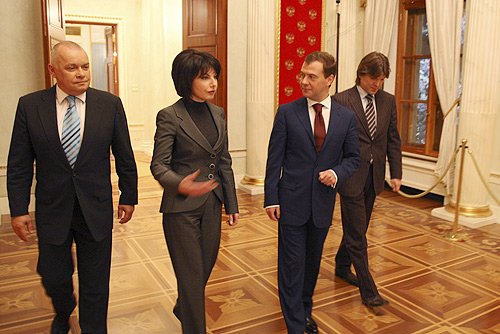
Kiselev (left), 2008 interview
Source: www.kremlin.ru
Over the years, political journalism in Russia has gradually morphed into a new definition – one that blurs the line between politicized and honest journalism.
Russian journalism blotched that line even more with Monday’s presidential decree to shut down the state-funded news agency, RIA Novosti, and merged it with a news outlet called Russia Today.
That means the relatively balanced news coverage achieved by RIA will be cast aside for what the head of the new organization, Dmitry Kiselev, calls on as the mission to restore a just attitude toward a Russia that is “an important country in the world” and one that has “good intentions.”
Honest, ethical reporting occurs when two of many criteria are upheld: distance and independence. A professional distance between the journalist and the subject should be observed at all times. This rings especially true in political situations, where the risks of backdoor maneuvering – favors, incentives and coercions – serve a temptation to any journalist who fancies themselves as an investigative Sherlock Holmes. Media independence occurs when a story angle does not serve to glorify its patrons or pursue a political agenda.
In the case of post-Yeltsin Russian journalism, these two standards have operated on a regrettably bare minimum, particularly with state-funded television and news outlets (for an exploration of how presidential decrees have affected Russian media, watch this discussion).
President Putin’s new decree runs the risk of altogether relegating these standards as irrelevant in the formation of Russian news coverage. The implications concerning Russia’s foreign policy and its image in the international arena are a heavy price to pay for – let’s take for instance – its recent trend toward a glorified public relations campaign for the upcoming Olympics.
A country’s image depends on its president, and a company’s image depends on its boss. A news agency headed by Dmitry Kiselev sends all the wrong foreign policy signals:
Sweden has a “sharp rise in child abortions, early sex is the norm from the age of nine, and it is not surprising that child impotence starts at twelve […] There you have European values in all their glory,” Kiselev said on Russian television.
“How did the Germans get the Sudetenland? Under the pretext of defending human rights,” Kiselev said on television.
Kiselev has taken the notions of opinionated and biased to dangerous levels. With such a track record of politically charged opinions, his new role at Russia Today creates a space for confrontation against the West at a time when Russia needs a space for the cultivation of ethical journalism. It carves a foreign policy agenda out of a domestic institution. To make the matter worse, the foreign policy agenda being upheld is nothing short of isolationist. Putin handed himself another reason for the West to be skeptical of his political intentions.
Political journalism in any country should serve as an outlet that champions objective coverage enough to fight against politicization rather than embrace it. In Russia, that model has become a lost cause.